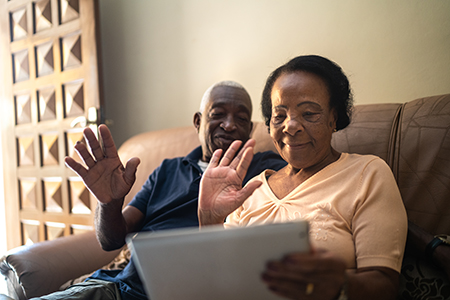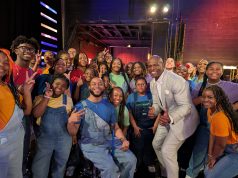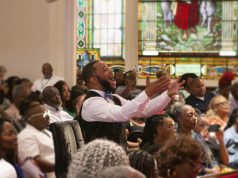By Adam Pope
UAB News
Mask orders. Constant cleaning. Quarantine. The COVID-19 pandemic has completely changed how many people live. This can be especially true for older adults. As one of the most at-risk populations for COVID-related complications, many older adults have been forced to isolate themselves, causing decreased physical and mental activity.
Medical experts from the University of Alabama at Birmingham say that, while limiting the amount of exposure to other people is the safest course, there are still ways to mitigate feelings of loneliness and decreased activity.
Andrew Duxbury, M.D., professor in the Division of Geriatrics, Gerontology and Palliative Care, says he has seen an uptick in cases of anxiety and depressive symptoms in patients. But, he says, two important things older populations can do are to keep moving and to stay connected.
“We are seeing a lot more anxiety and seeing significant worsening of depressive symptoms,” Duxbury said. “We’re seeing peoples’ routines disrupted, and routines are incredibly important for people with cognitive impairments and dementia to help them maintain their function. When normalcy gets disrupted suddenly, they don’t handle change well.”
Duxbury adds that people are designed to be together and support each other.
“Aging is a difficult time of life that requires a great deal of support, because no matter how old we get or how frail we get, our brains still to a certain extent think of ourselves as young, vibrant people,” he said. “There is a mismatch between how we want to conceive of ourselves and what’s really going on. It’s a tough one to overcome.”
Move It, Move It
Physical activity is crucial to maintaining a sense of normalcy, according to UAB Center for Exercise Medicine Director Tom Buford, Ph.D.
“The best exercises are the ones that you enjoy and will stick with,” Buford said. “In particular, during the pandemic, things you can do outside — walking, biking and hiking are great, as well as things you can do at home like chair stands, squats, dumbbell exercises and balance exercises. Swimming is also great if you have a place to do it safely.”
According to the National Osteoporosis Foundation, approximately 10 million Americans have osteoporosis and another 44 million have low bone density, placing them at increased risk. This means half of all adults age 50 and older are at risk of breaking a bone and should be concerned about bone health.
Beth Kitchin, Ph.D., RDN, co-director of the UAB Tone Your Bones program, says people with osteoporosis should not sit for too long.
“If you’re sitting and watching TV, during commercials get up and march in place until the commercials are over,” Kitchin said. “Weight-bearing exercises help maintain your bone strength. This can include anything where you are up on your feet, like walking, gardening, dancing, treadmill or aerobics.”
Kitchin also says a proper diet is extremely important.
“Make sure you’re eating healthfully,” she said. “If you’re not getting enough calcium from foods, take supplements. You can check out our UAB Tone Your Bones Virtual Classroom to find out how much calcium you need and where you can get it.”
Kitchin also recommends getting 800 to 2,000 international units of vitamins from your dietary supplements.
“Check out all of the supplements you take and see if they have vitamin D in them,” Kitchin said. “If you’re not getting enough, add on with an extra vitamin D tablet.”
A Sound Mind
“While social distancing, self-isolation and quarantining at home can help to minimize the exposure to COVID-19 among older adults, especially among those who have other risk factors, these behaviors can also lead to loneliness, sadness, boredom, feelings of loss, stress, lack of motivation, lowered energy, problems with sleep, and clinical depression or anxiety in some cases,” said Laura Dreer, Ph.D., a clinical psychologist with UAB’s Department of Ophthalmology and Visual Sciences.
Changes in valued activities such as spending time with grandchildren, going to religious gatherings or community events, or having family dinners also have impact on one’s emotional well-being during these times.
“This issue may be even more important as we head into the holidays and winter months,” Dreer said. “Not being able to physically interact with friends/family members as part of regular social interactions can also affect one’s mood.”
Dreer adds that isolation and loneliness can lead to serious emotional as well as physical health challenges if left unresolved. This can include a greater risk for depression and suicide, high blood pressure, and premature death; and increased risk for dementia, obesity, heart disease and stroke. This is a particularly important issue among older adults given approximately 25-30 percent were socially isolated prior to the pandemic.
What are good, safe stress relievers for older adults?
Dreer says there are a number of safe things older adults can do to mitigate feelings of loneliness:
Older adults and their loved ones can keep in touch by a variety of ways: writing letters, telephone, virtual visits, having visitors over at a physically safe distance and with PPE.
There are local community agencies on aging that have telephone or virtual friend group programs available to help prevent social isolation and promote connections.
Take up a new hobby that can be done from home. Perhaps there is something you have always wanted to do but did not have the time. Now is the time to explore.
Practice mindfulness and stress relievers such as yoga or meditation. There are numerous health benefits related to learning and practicing these simple exercises.
Learn more about keeping yourself safe at uab.edu/coronavirus





